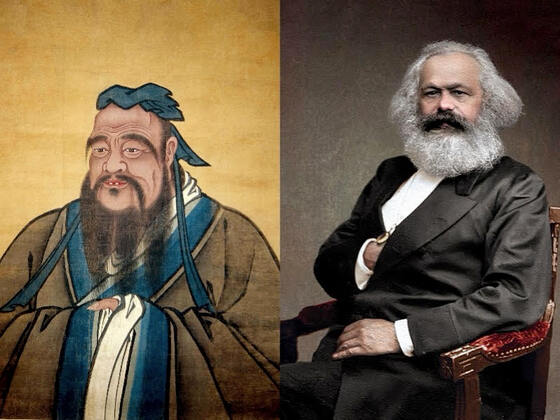|
8/4/2021 Book Review: Daniel A. Bell & Hahm Chaibong- Confucianism for The Modern World (2003). Reviewed By: Thomas RigginsRead Now"I have always heard that a gentleman helps the needy; he does not make the rich richer still."-- Confucius Daniel A. Bell and Hahm Chaibong have edited a book called Confucianism for the Modern World (Cambridge, 2003). In their introduction the editors discuss the contemporary relevance of the Confucian tradition (the purpose of the book). The question is – is Confucianism a dead tradition or is it meaningful for the contemporary world? There are five questions which they say must be addressed. I don’t think they are formulated quite rightly so I shall amend them slightly. The first is what Confucian values "should be promoted in contemporary East Asian societies?" This I think is too narrow. The "modern world" encompasses more than just East Asia. I would maintain that Confucianism has useful traditions that societies other than the traditional Asian ones can benefit from studying and applying. The second question is, "How should this be promoted?" The third is, "What are the political and institutional implications of ‘Confucian humanism’?" Confucian "humanism" can be summed up by saying that for a good Confucian the slogan "People Before Profits," that we on the left are very familiar with, would not sound out of place. The fourth question is "How do the practical implications of modern Confucianism differ from the values and workings of liberal capitalist societies?" The editors have added "modern" as a modifier for good reason. The values of traditional Confucianism can, I think, be brought into line with those of socialist or communist humanism but they can only be adapted to the values of capitalism, liberal or otherwise, by doing violence to their core ethical commitments. I think this question also reveals one of the purposes of the book is to try and use a warped and mutated "Confucianism" as an apologetic for East Asian capitalism. The last question deals with the adoption of Confucianism to this project (conformity to liberal capitalism) and if it can "be justified from a moral point of view." I don’t think that it can be, but I think the editors of this book think that it can. Here are two examples. One of the contributors, Gilbert Rozman, argues that Confucianism can be adapted to support "decentralization," "regionalism" and "localism." But to what purpose? Some of his examples suggest that the purpose is to further the interests of corporate globalization and not Confucian "humanism". For example, his reading of modern "Confucianism" might convince China to respect "Taiwan’s right to autonomy." He also suggests that it is a good counter- balance to "Anglo-Saxon liberalism" [Rozman’s term for monopoly capitalism] on the one hand, and "Soviet-launched socialism" on the other. The former represents "individualism," the latter "statism." He maintains East Asia has a third system – some type of "familyism." Actually, with the exception of China, Vietnam, the DPRK and Laos [statist in Rozman’s terminology], East Asia is firmly in the control of monopoly capitalism. Rozman thinks attempts to counter "U.S. influence endanger the gains achieved through trans-Pacific economic and security ties," The WTO is cited as a "gain." He forgot the IMF and the World Bank. This is, to my mind, merely using Confucianism as a cover for the trans-national imperialist exploitation of Asian peoples under the guise of "humanism" and decentralization. Daniel Bell, one of the editors, in his contribution, explicitly states that he assumes "some form of capitalism is here to stay for the foreseeable future and any realistic defense of economic arrangements in East Asia needs to take this fact into account." Since I am not interested in using Confucian philosophy in order to make a "defense of economic arrangements in East Asia" but rather to see what the logical implications of its humanistic values are, I cannot agree with Professor Bell’s use of Confucianism. I agree with him that the material welfare of the people is one of, if not the main duty of the state according to Confucianism, but disagree completely when he says, "There is no doubt that Confucians would... oppose Soviet-style planned economies." I say this because the reason he gives for saying that, "Absolute private property rights" might be justified if they provided for "the basic means of subsistence." This argument from instrumental grounds also applies to a planned economy. In fact, I think Confucian humanism is completely compatible with a Marxist interpretation and totally incompatible with the theoretical and practical functioning of capitalism with the possible exception of some capitalist inspired market reforms guided by a desire to strengthen a socialist state. AuthorThomas Riggins is a retired philosophy teacher (NYU, The New School of Social Research, among others) who received a PhD from the CUNY Graduate Center (1983). He has been active in the civil rights and peace movements since the 1960s when he was chairman of the Young People's Socialist League at Florida State University and also worked for CORE in voter registration in north Florida (Leon County). He has written for many online publications such as People's World and Political Affairs where he was an associate editor. He also served on the board of the Bertrand Russell Society and was president of the Corliss Lamont chapter in New York City of the American Humanist Association. Archives August 2021
0 Comments
Leave a Reply. |
Details
Archives
July 2024
Categories
All
|

 RSS Feed
RSS Feed